Foreign relations of Algeria
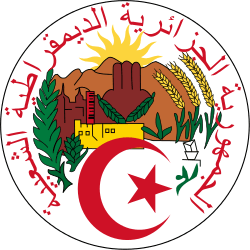 |
| This article is part of a series on the politics and government of Algeria |
|
Constitution |
|
Government |
| Foreign relations |
|
Politics portal |
Algeria has traditionally practiced an activist foreign policy. In the 1960s and 1970s, Algeria was noted for its great support of Third World policies and independence movements.
President Bouteflika
Since his inauguration in 1999, President Bouteflika has worked to extend Algeria's international influence, traveling extensively throughout the world. In July 2001, he became the first Algerian President to visit the US White House in 16 years. He has made official visits, among others, to France, Republic of South Africa, Italy, Spain, Germany, the People's Republic of China, Japan, and Russia since his inauguration.
Africa
Algeria has friendly relations with its neighbors in the Maghreb, Tunisia and Libya, and with its Sub-Saharan neighbors Mali and Niger. Algeria has taken the lead in working on issues related to the African Continent. Host of the Organisation of African Unity Conference in 2000, Algeria also was key in bringing Ethiopia and Eritrea to the peace table in 2000. It has worked closely with its African neighbors to establish the New African Partnership. Algeria has taken a lead in reviving the Union of the Arab Maghreb with its regional neighbors.
Egypt withdrew its ambassador to Algeria in November 2009 after attacks by the Algerian national football team on the Egyptian football fans in the aftermath of a qualification playoff in Cairo, Egypt for the 2010 FIFA World Cup although the bus of the players of Algeria was attacked and players were wounded by Egypt supporters. Fifa ruled against Egypt.
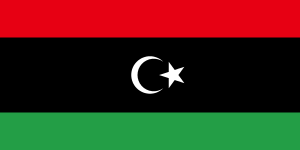 Libya
Libya
Algeria–Libya relations have generally been amicable.[1] Libyan support for the Polisario in the Western Sahara facilitated early post independence Algerian relations with Libya.[1] Libyan inclinations for full-scale political union, however, have obstructed formal political collaboration because Algeria has consistently backed away from such cooperation with its unpredictable neighbour.[1] (A vote by the CCN on June 30, 1987, actually supported union between Libya and Algeria, but the proposal was later retracted by the FLN Central Committee after the heads of state failed to agree.[1]) The Treaty of Oujda between Libya and Morocco, which represented a response to Algeria's Treaty of Fraternity and Concord with Tunisia, temporarily aggravated Algerian-Libyan relations by establishing a political divide in the region--Libya and Morocco on one side; Algeria, Tunisia, and Mauritania on the other.[1] Finally, in 1988 Libya was invited to participate in the inter-Maghrib commission that was responsible for developing the North African union.[1] The establishment of the UMA in February 1989 marked the first formal political or economic collaboration between the two neighbours.[1]
 Morocco
Morocco
Algeria–Morocco relations have been dominated by the issue of self-determination for the Western Sahara since their independence. The national integrity of this former colonial territory has caused a deep-seated antagonism and general mistrust between the two nations that has permeated all aspects of Moroccan-Algerian relations. Algeria's interest in the region dates back to the 1960s and 1970s when it joined Morocco, Mauritania & Libya in efforts to remove the Spanish from the territory. After Spain announced its intention to abandon the province, then known as Spanish Sahara, in 1975, the united front presented by the Maghreb nations quickly disintegrated, as a result of Morocco, and subsequently Mauritania, staking claims to the territory. Algeria, although not asserting any territorial ambitions of its own, was averse to the absorption of the territory by any of its neighbors and called for self-determination for the Saharawi people. Before the Spanish evacuation, Spain, Morocco, and Mauritania agreed to divide the territory and transfer the major part to Morocco and the remaining southern portion to Mauritania. This agreement violated a United Nations (UN) resolution that declared all historical claims on the part of Mauritania or Morocco to be insufficient to justify territorial absorption and drew heavy Algerian criticism.[1]
 Tunisia
Tunisia
Smaller and in a more precarious position vis-à-vis Libya, Tunisia has consistently made efforts to align with Algeria.[1] In the 1970s, Tunisia reversed its position on the Western Sahara so as not to antagonize Algerian authorities.[1] Tunisia was the first nation to sign the Treaty of Fraternity and Concord with Algeria, in 1983.[1] Throughout Algeria's independent history, it has joined in a number of economic ventures with Tunisia, including the transnational pipeline running from Algeria through Tunisia to Italy.[1] In 1987 the departure from power in Tunisia of President Habib Bourguiba and his replacement by the more diplomatic Zine el Abidine Ben Ali brought the two nations closer again.[1]
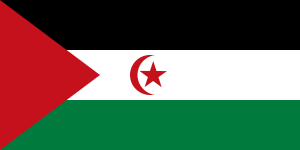 Western Sahara
Western Sahara
Since 1976, Algeria has supported the Polisario Front, a group claiming to represent the population of Western Sahara, which is based among the 90,000 Sahrawi refugees who reside in refugee camps in Algeria. Contending that the Sahrawis have a right to self-determination under the UN Charter, Algeria has provided the Polisario with material, financial, and political support and sanctuary in southwestern Algeria's Tindouf Province. UN involvement in the Western Sahara includes MINURSO, a peacekeeping force, and UNHCR, for refugee assistance and resettlement. Active diplomatic efforts to resolve the dispute under the auspices of the Special Representative of the Secretary General are on-going. Although the land border between Morocco and Algeria was closed in the wake of a terrorist attack, the two have worked at improving relations.
Europe
 Bulgaria
Bulgaria
- Formal relations started in 1964
- Algeria has an embassy in Sofia[2]
- Bulgaria has an embassy in Algiers[3]
- Both are members of the Union for the Mediterranean
- Algerian Ministry of Foreign Affairs about relations with Bulgaria (in French only)
 Cyprus
Cyprus
Cyprus and Algeria have concluded various agreements. For example, in November 1997, Algeria and Cyprus agreed on a framework for maritime exchanges between the two countries, lifting obstacles on the free movement of ships and offering preferential treatment at the ports in both countries.[4] In December 1999 Algeria and Cyprus signed an air transport agreement to introduce a legal framework governing air routes between Algeria and Cyprus.[5] In July 2000, Algerian news agency APS signed a cooperation agreement with the Cypriot news agency[6] that covers exchange of English news items and photographs.[7]
In December 2001, the Algerian firm Sonatrach and Cyprus oil company Medex Petroleum signed an exploration deal covering the north of Bordj Omar Idriss in the Illizi basin in south-eastern Algeria.[8] Cyprus is considering Algeria as a potential partner to assist with extracting untapped oil and gas from the island's exclusive economic zone. Other partners being considered are Libya, Russian and Algeria – full details of the negotiations have not yet been released to the public domain.[9]
 Denmark
Denmark
- Denmark has an embassy in Algiers [10]
- Algeria has an embassy in Copenhagen [11]
 France
France
In the early 1990s, nearly 20 percent of all Algerian exports and imports were destined for or originated from France. More than 1 million Algerians resided in France and there were numerous francophones in Algeria, creating a tremendous cultural overlap. French remained the language of instruction in most schools and the language used in more than two-thirds of all newspapers and periodicals and on numerous television programs. Algeria and France share a cultural background that transcends diplomatic maneuvers and has persisted throughout periods of "disenchantment" and strained relations. Over time, however, the arabization of Algeria and the increasing polarization of society between the francophone elite and the Arab masses have mobilized anti-French sentiment. Support for the arabization of Algerian society—including the elimination of French as the second national language and emphasis on an arabized education curriculum—and the recent success of the FIS indicate a growing fervor in Algeria for asserting an independent national identity. Such an identity emphasizes its Arab and Islamic cultural tradition rather than its French colonial past. However, France's support for the military regime that assumed power in early 1992 indicates that the cooperative relations between the two countries remain strong.[1]
 Greece
Greece
Relations between the two countries have been traditionally friendly since Algeria's first years of independence. Greece maintains an embassy in Algiers, and Algeria is represented in Greece by its embassy in Athens. Both countries are members of the Union for the Mediterranean. Greece was among the first countries to establish diplomatic relations with Algeria after its independence in 1962, by upgrading the then Greek Consulate General in Algiers to an Embassy in 1963.[12] As of 2009, the two countries had in place three bilateral agreements:
- Agreement on Economic, Scientific and Technical Cooperation (1982).
- Agreement on Educational Cooperation (1988).
- Agreement on Mutual Protection and Promotion of Investments (2000).[12]
The Algerian Minister of Foreign Affairs visited Greece in February 2001, returning a previous visit paid by the Foreign Minister of Greece to Algeria.[12][13] In 2003, Greek [National] Defence Minister Ioannos Papandoniou visited Algeria to discuss ways to consolidate military cooperation between Algeria and Greece.[14]
Since 2000, Algeria has supplied Greece with natural gas by virtue of a long-term Agreement between the two countries. The liquefied natural gas is transported by special vessels before eventually reaching the appropriate plant located in Megara, Attica.[15] The exports of Algerian products to Greece amounted to $89 million in 2001, including mainly oil and oil derivatives, natural gas, inorganic chemicals, iron and steel. In the same year, Greek exports to Algeria amounted to $50.78 million, consisting mainly of cereals and related derivatives, tobacco products, pharmaceuticals, medical and non-ferrous minerals.[12]
In 2007, Algeria was ranked 6th among Greece's Arab trade partners.[16]
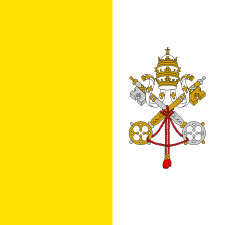 Holy See
Holy See
There have been tensions in the relationship in recent years due to criticism of the Algerian government by the Vatican[17] and increasing restrictions imposed on Algerian Catholics.[18]
 Romania
Romania
- Algeria has an embassy in Bucharest[19]
- Romania has an embassy in Algiers[20]
- Both are members of the Union for the Mediterranean
- Algerian Ministry of Foreign Affairs: information about relations with Romania (in French only)
 Russia
Russia
- Russia has an Embassy in Algiers and a consulate in Annaba.
- Algeria has an Embassy in Moscow.
 Serbia
Serbia
- Formal relations started on 1962
- Algeria has an embassy in Belgrade.[21]
- Serbia has an embassy in Algiers since 1962.[22]
- Serbian Ministry of Foreign Affairs about bilateral relations with Algeria
 Ukraine
Ukraine
Algeria recognized Ukraine's independence in 1992. Diplomatic relations between both countries were established in 1993. Algeria has an embassy in Kiev. Ukraine has an embassy in Algiers (opened in 1999).[23]
 Turkey
Turkey
- Algeria has an embassy in Ankara, and a general consulate in Istanbul[24]
- Turkey has an embassy in Algiers
- Turkish Ministry of Foreign Affairs about relations with Algeria
- The travel visa between Algeria and Turkey has recently been removed
Rest of the world
 Argentina
Argentina
- Formal relations started on 3 March 1973
- Algeria have an embassy in Buenos Aires
- Argentina have an embassy in Algiers
- Both are members of Group of 77 and of the Group of 24
- Algerian Ministry of Foreign Affairs about the meeting between both presidents in November 2008 (in French only)
- Argentine Ministry of Foreign Relations: list of bilateral treaties with Algeria (in Spanish only)
On November 18, 2008, the President of Argentina Cristina Fernández de Kirchner made an official visit to Algiers and met her counterpart, the President of Algeria, Abdelaziz Bouteflika.
 Israel
Israel
Algeria has never had official diplomatic relations with Israel. In the mid 90s, while Israel and north African states slowly started diplomatic relations, Algeria remained one of the last countries to consider such a move. It was only when Israeli prime minister Ehud Barak met Algerian President Abdalziz Bouteflika at the funeral of Moroccan King Hassan ll on July 25, 1999 that comments about rapprochement were made.[25]
 Malaysia
Malaysia
Algeria has an embassy in Kuala Lumpur,[26] and Malaysia has an embassy in Algiers.[27]
 Mexico
Mexico
Diplomatic relations between Algeria and Mexico were established on 21 October 1964.
- Algeria has an embassy in Mexico City.[28]
- Mexico has an embassy Algiers.[29]
 Pakistan
Pakistan
Algeria enjoys friendly relations with Pakistan, which offered support during Algeria's struggle for independence. Pakistan was among the first nations to recognize the "Provisional Government of the Republic of Algeria" in exile on 19 September 1958, and facilitating the opening of an official mission in Karachi (Pakistan).
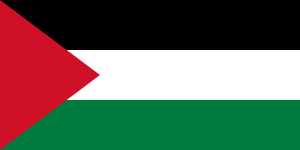 Palestine
Palestine
Algeria has been a strong proponent of the rights of the Palestinian people, calling publicly for an end to violence in the Occupied Palestinian Territories.
 Saudi Arabia
Saudi Arabia
 Singapore
Singapore
Algeria and Singapore enjoy close relations in both economic and political areas. The two governments have also conducted exchanges to boost cooperation between both nations.
 United States
United States
In July 2001, President Abdelaziz Bouteflika became the first Algerian President to visit the White House since 1985. This visit, followed by a second meeting in November 2001, a meeting in New York in September 2003, and President Bouteflika's participation at the June 2004 G8 Sea Island Summit, is indicative of the growing relationship between the United States and Algeria. Since the September 11, 2001 attacks in the United States, contacts in key areas of mutual concern, including law enforcement and counter-terrorism cooperation, have intensified. Algeria publicly condemned the terrorist attacks on the United States and has been strongly supportive of the international war against terrorism. The United States and Algeria consult closely on key international and regional issues. The pace and scope of senior-level visits has accelerated. In April 2006, then-Foreign Minister Bedjaoui met with Secretary of State Condoleezza Rice.
Diplomatic missions
Algeria has diplomatic relations with more than 100 foreign countries, and over 90 countries maintain diplomatic representation in Algiers.
International disputes:: part of Algeria's south-eastern region is also claimed by Libya; Algeria supports the exiled Polisario Front of the Western Sahara; it rejects the Moroccan administration of the Western Sahara.
See also
- List of diplomatic missions in Algeria
- List of diplomatic missions of Algeria
- Visa requirements for Algerian citizens
References
- ↑ 1.0 1.1 1.2 1.3 1.4 1.5 1.6 1.7 1.8 1.9 1.10 1.11 1.12 1.13 Entelis, John P. with Lisa Arone. "The Maghrib". Algeria: a country study. Library of Congress Federal Research Division (December 1993). This article incorporates text from this source, which is in the public domain.
- ↑ "The familiar and the exotic". The Sofia Echo. 26 November 2010. Retrieved 30 January 2014.
- ↑ Bulgarian embassy in Algiers
- ↑ "Algeria signs maritime agreement with Cyprus". Algerian radio, Algiers. 1997-11-12. Retrieved 2009-05-05.
- ↑ "Algeria, Cyprus sign air transport agreement". Algerian TV, Algiers. 1999-12-03. Retrieved 2009-05-05.
- ↑ "Algeria/Cyprus: News agencies sign cooperation agreement". Algerian TV, Algiers. 2000-07-31. Retrieved 2009-05-05.
- ↑ "Algeria Sign News Cooperation Agreement". Xinhua News Agency. 2000-07-28. Retrieved 2009-05-05.
- ↑ "Algerian, Cyprus oil companies sign exploration deal". Algerian TV, Algiers. 2001-12-23. Retrieved 2009-05-05.
- ↑ "Cyprus and Egypt keep LNG talks secret". FinancialMirror. April 9, 2009. Retrieved May 9, 2009.
- ↑ Denmark embassy in Algeria
- ↑ Algeria embassy in Denmark
- ↑ 12.0 12.1 12.2 12.3 Hellenic Republic Ministry of Foreign Affairs, Algeria
- ↑ Algerian, Greek foreign ministers agree to boost cooperation (Algerian Radio)
- ↑ Greek defence minister in Algeria 28 January (Algerian Radio)
- ↑ ALGERIA: ALGERIAN GAS EXPORTS TO GREECE, IPR Strategic Business Information Database
- ↑ Greece Ministry of Foreign Affairs, Algeria
- ↑ "Pope speaks out on Algeria and Iraq". BBC News. 1998-01-11. Retrieved 2009-05-02.
- ↑ "Growing Persecution in Algeria and Egypt". Catholic Online. 2008-07-13. Retrieved 2009-05-02.
- ↑ Romanian Ministry of Foreign Affairs: direction of the Algerian embassy in Bucharerst
- ↑ Romanian Ministry of Foreign Affairs: direction of the Romanian embassy in Algiers
- ↑ Serbian Ministry of Foreign Affairs: direction of the Algerian embassy in Belgrade
- ↑ Serbian embassy in Algiers (in French and Serbian only)
- ↑ Ukrain-Algeria relations(At the site of the Ukrainian embassy in Israel; also at the Ukrainian Mission at the EU
- ↑ Algerian embassies in Europe including Ankara
- ↑ The Middle East and North Africa
- ↑ "Algerian Embassy". Embassy of Algeria, Kuala Lumpur. Retrieved 2 February 2014.
- ↑ "Official Website of Embassy of Malaysia, Algiers". Ministry of Foreign Affairs, Malaysia. Retrieved 2 February 2014.
- ↑ Embassy of Algeria in Mexico City (in Spanish)
- ↑ Embassy of Mexico in Algiers (in Arabic and Spanish)
![]() This article incorporates public domain material from websites or documents of the CIA World Factbook.
This article incorporates public domain material from websites or documents of the CIA World Factbook.
![]() This article incorporates public domain material from websites or documents of the United States Department of State (Background Notes).
This article incorporates public domain material from websites or documents of the United States Department of State (Background Notes).
| ||||||||||||||||||||||||||||||
| ||||||||||||||